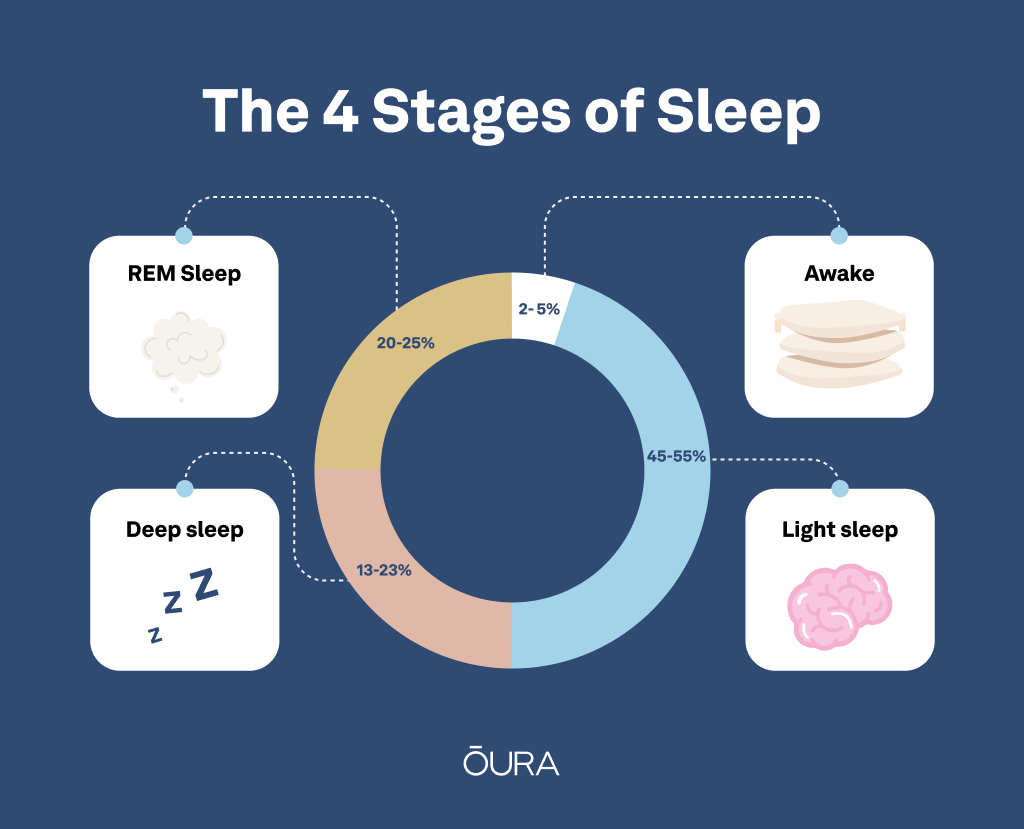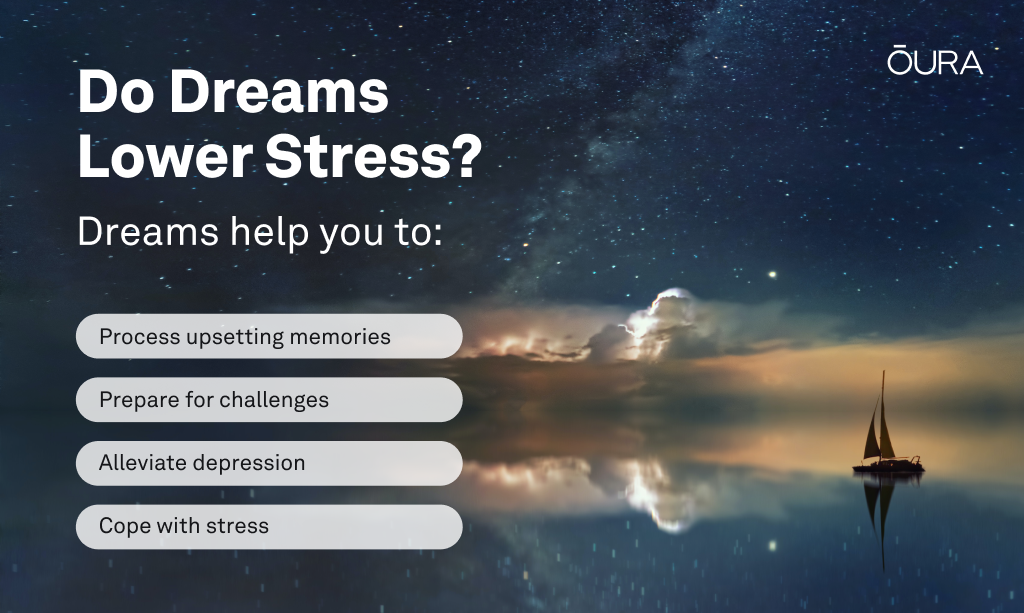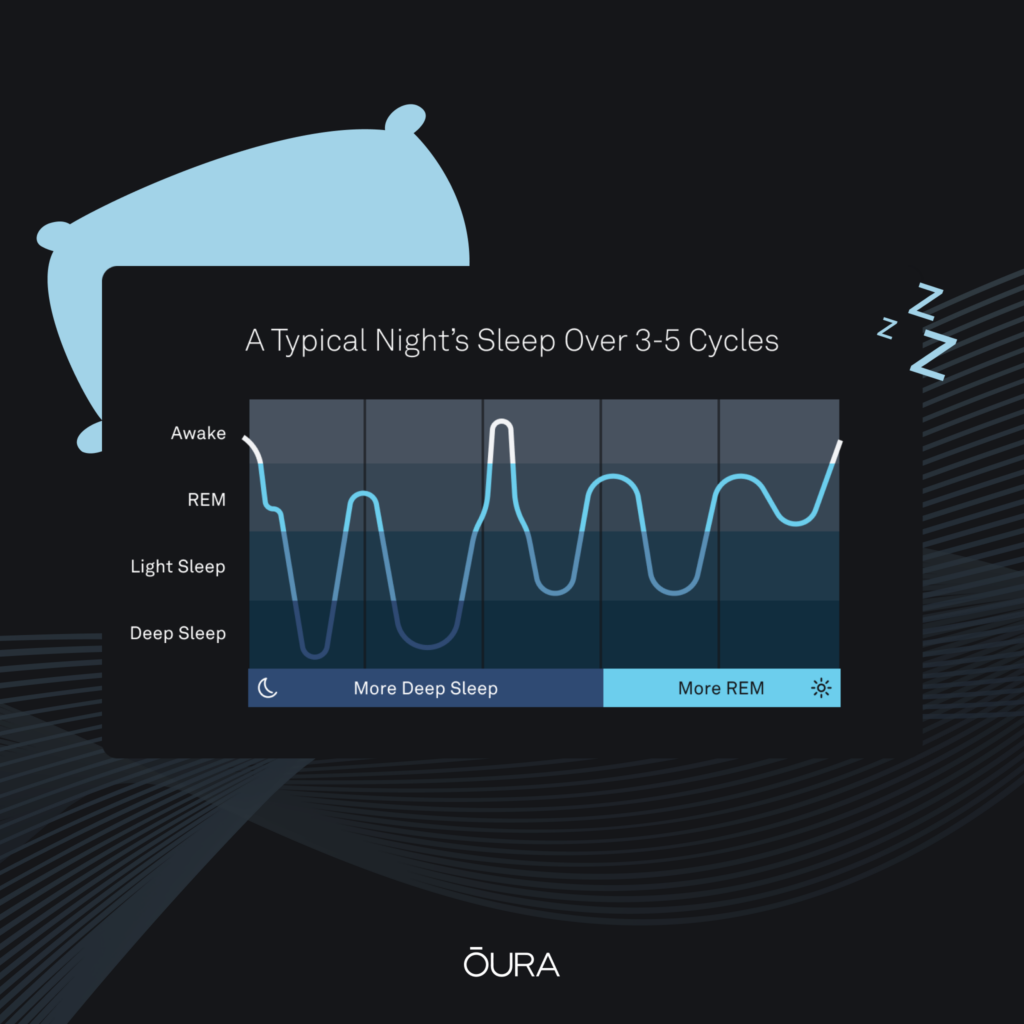- REM sleep — the stage in which dreams occur — plays a vital role in regulating your emotions and stress levels.
- Most people need around 90 minutes of REM sleep each night.
- REM sleep can help you process emotions, prepare for challenges, and alleviate stress and depression.
Even if you swear you don’t remember having any dreams, science says we all drift off to dreamland during the night. In fact, research estimates that the average person will spend about two hours dreaming per night. So, rather than if we dream, the more pressing question among scientists is why we dream. Turns out, there’s a science-backed connection between dreams and emotions.
Some scientists think of sleep as a “data dump” — a time to process all of the information and memories you’ve collected during the day. Dreaming may be a byproduct or even an active part of that. Others say dreams promote creative thinking (along with the loss of inhibition) and may be responsible for some of your biggest breakthroughs.
Another purpose of dreaming that researchers pose: Dreaming may help lower stress and regulate emotions.
RELATED: How Stress Affects Your Sleep
The Connection Between REM Sleep and Dreaming
Rapid eye movement (REM) sleep occurs for the first time about 60-90 minutes after falling asleep and then every 90 to 120 minutes thereafter. In other stages of sleep, your brain waves slow down. During deep sleep, for example, overall brain activity slows and your body repairs your muscles and bones while also working to boost your immune system.
The amount of time spent in REM sleep is one of the Sleep Contributors that influence your Sleep Score. For most people, the ideal amount of REM sleep is around 20-25 percent of your total time spent asleep. Any lower, and it will negatively impact your Sleep Score.
| Member Tip: If you notice your REM sleep is consistently low, try going to bed earlier, as most REM sleep happens during the second half of the night. Track your Sleep Score and REM sleep using the Trends feature to see if an earlier bedtime helps them improve. |

In REM sleep your brain activity heightens. The brain waves even look similar to when you’re awake. Most of your dreaming also happens during this time, though some may also occur in non-REM sleep. This association between dreams and REM sleep seems to contribute to lowering stress and regulating emotions.
REM, Dreams, and Emotions
It’s widely agreed that REM sleep has a pivotal role in the processing of notable, emotional waking-life experiences. It also plays a huge part in transforming recent experiences into long-term memories — something that helps regulate mood.
Several studies have also suggested that REM sleep can affect how accurately people can perceive and process external stimuli. For example, research conducted by sleep expert Matthew Walker, PhD, demonstrated that people who achieved REM sleep during a nap were more effective in identifying expressions of positive emotions than those who didn’t.
Moreover, during REM sleep, the brain processes emotional experiences in a “safe” environment. According to Walker, REM sleep is the only time your brain is free of the anxiety-triggering molecule noradrenaline. Any processing that happens during this time may take the emotional edge off difficult memories, helping to defuse the impact of feelings that may have come up and remained unaddressed during the day.
If you don’t come to terms with these feelings, they might linger and disrupt your moods and behaviors the next day. In other words, a bad day filled with negative emotions may not seem quite so painful after you dream.
4 Ways Dreaming Helps Lower Stress
In addition to improving mood, research has found that REM sleep and dreaming help you cope with stress in various ways:
RELATED: Stressed? Anxious? REM Sleep Can Be Your Mind’s Reset Button

1. Dreaming may help you process upsetting memories.
REM sleep can allow you to work through upsetting memories in a safer, calmer environment, reducing mental and emotional stress. Furthermore, processing upsetting memories may reduce the intensity of your emotional response to them once you’re awake, helping to reduce any negative emotions that may lead to stress.
2. Dreaming may help you prepare for challenges.
When you dream, your brain generates scenarios and simulates events that you might encounter in real life. This is the brain’s way of preparing for challenges before they occur, thereby assisting you in anticipating potential difficulties and developing strategies for dealing with them. As a result, you will be less stressed when you face difficulties.
| Member Tip: One way to evaluate your stress levels is to track your heart rate variability (HRV) in the Oura App. A lower HRV can indicate that something is stressing your mind and body, while a higher HRV is an indicator of lower stress levels. |
READ MORE: HRV and Stress: What HRV Can Tell You About Your Mental Health
3. Dreaming may help alleviate depression.
Studies have shown that people who recall their dreams are more likely to recover from depression. This could be because dream recall is associated with better sleep quality, which can have a positive impact on cognitive function and stress reduction.
It’s worth noting that dream recall is highest during REM sleep. The chances of dream recall after awakening are about 80-90% in REM sleep and less than 50% in other sleep stages (almost 0% in deep, or slow-wave, sleep).
One study found that combining Oura data with self-reported mood changes could accurately predict anxiety and depression.
4. Dreaming may provide a coping mechanism.
Nightmares are more likely to occur during the period of sleep when REM intervals lengthen. You may consider them an unpleasant experience, but studies suggests that they can help you alleviate stress. In one study of 412 psychology students, researchers found a positive correlation between nightmares and coping with stress.

Research has also suggested that experiencing nightmares can increase resilience and adaptive coping strategies in individuals. This increased resilience can help you better cope with stressors in waking life.
However, dreaming has a darker side, particularly for people suffering from disorders such as post-traumatic stress disorder (PTSD).
The Darker Side of Dreams: How Nightmares and Sleep Disorders Impact Emotions & Stress
For people with post-traumatic stress disorder (PTSD), frequent nightmares are closely related to emotional reactivity. It’s not known exactly why, but both show altered activity in the same brain regions.
Because of the high amount of cortisol (the stress hormone) that correlates with PTSD, researchers believe it negatively affects the interaction between the hippocampus and the amygdala — two of the main brain systems that consolidate emotional memory. Difficulty with regulating emotions can, in turn, lead to a negative emotional bias that perpetuates stress.
Nightmares and sleep disorders can also disrupt the quality and quantity of sleep, which can lead to increased stress and emotional unrest. Sleep is essential for restoring and regulating the body and mind, and without enough sleep, individuals may struggle to manage their emotions and stress levels. In one study, nightmares were linked to a fivefold increase in suicide attempts.
If you’re experiencing nightmares or dreams that disrupt your restful sleep and put you in a consistently bad mood throughout the day, it might be time to seek medical attention from a mental health professional.
RELATED: What Causes Period Nightmares? The Science Behind Bad PMS Dreams
How to Ensure a Dream State
For those of us seeking high-quality — and as peaceful as possible — sleep tonight, Walker suggests these 5 tips:
- Upgrade your sleep hygiene: Good sleep hygiene practices can help promote better sleep quality and reduce the likelihood of nightmares. This includes creating a comfortable sleep environment, keeping the bedroom cool and dark, and avoiding electronics in the bedroom. Make sure your mattress and pillows are supportive of spinal alignment and that your sheets and blankets are made from natural fabrics.
Member Tip: Oura members can use Tags to track their habits and behaviors to learn which ones positively impact their sleep. - Follow a consistent bedtime routine: Although this is part of sleep hygiene, it deserves a special mention. Maintaining a regular sleep schedule keeps the body’s internal clock on track and can help you ensure you cycle through all of the 4 stages of sleep appropriately.

- Journal before bed: Writing down your thoughts and feelings before bed can help you process any stress or anxiety from the day and reduce the likelihood of nightmares. This can be a helpful way to release any negative emotions and promote more restful sleep.
- Control your diet and caffeine intake, especially in the evenings: Consuming heavy meals or caffeine in the evening can disrupt sleep and increase the likelihood of nightmares. It’s important to avoid heavy meals or caffeine several hours before bedtime to promote better sleep quality. Log any late meals or caffeine consumption in the Oura App using the Tags feature, then track your Trends over time to see how they affect your sleep.
- Hydrate adequately, but not excessively: Dehydration can impact sleep quality and increase the likelihood of nightmares. It’s a good idea to stay hydrated throughout the day, but not to consume too much liquid before bedtime to avoid sleep disruptions.
Track Your Sleep With Oura
Oura members can track different stages of sleep as well as their behaviors, routines, and biometrics to understand how to improve their sleep and dream quality. Oura’s new sleep staging algorithm, which matches the gold standard sleep lab test, allows you to measure the quality of your sleep and provides insights on how to improve it. You can also learn how other factors, such as nighttime movements, impact your sleep quality.
RELATED: How to Fall Asleep Fast & Improve Sleep Latency
About the Oura Expert
Matthew Walker, PhD, is a professor of neuroscience at UC Berkeley, and founder and director of the school’s Center for Human Sleep Science. Prof. Walker is the author of the New York Times and international bestseller, Why We Sleep: Unlocking the Power of Sleep and Dreams. Professor Walker’s TED talk, “Sleep is your Superpower,” has garnered over 16 million views to date. His research examines the impact of sleep on human health and disease. He has been featured on numerous television and radio outlets, including CBS 60 Minutes, National Geographic Channel, and more, and hosts the 5-star-rated, The Matt Walker Podcast.











